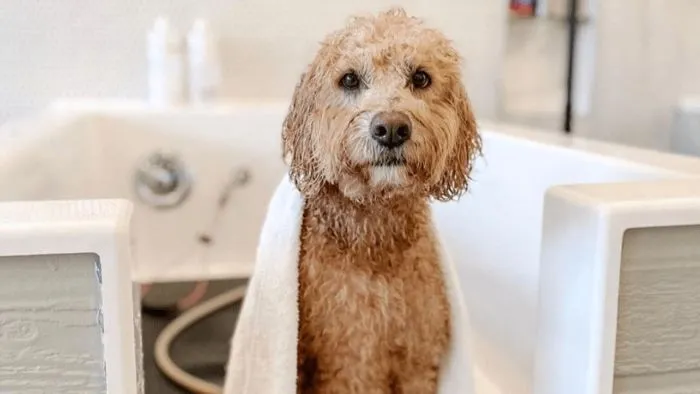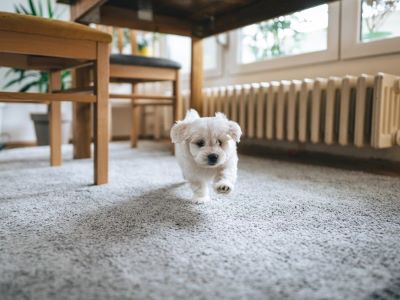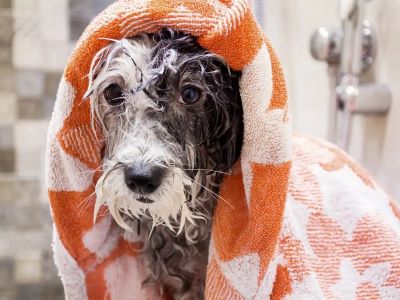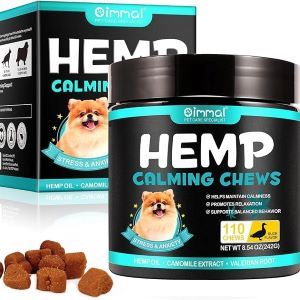You have just given your dog a nice and clean bath, and you are ready to cuddle with them on the couch. But, your dog suddenly dashes out of the bathroom, leaving a trail of water behind them. They run around the house like a rocket 🚀, shaking their head, rubbing their body on the furniture or even rolling on the floor. But the question here is, “Why Do Dogs Go Crazy After a Bath?”
This behaviour is known as the post-bath zoomies or FRAP (Frenetic Random Activity Periods). It is very common and normal for dogs to do this after a bath, but what causes it? Why do dogs go crazy after a bath? Is it a sign of happiness, stress, or something else? Let us explore some of the possible reasons why dogs go crazy after a bath, and how you can make bath time less stressful and more fun 🤩 for your dog.

You Might Also Like:
Why Do Dogs Go Crazy After a Bath?
There is never a universal reason that contributes to why dogs go crazy after a bath. But, through experiences and beliefs, there have been various causes that drive your dog crazy after a bath.
Relief
Most of all dogs hate getting a bath. Even if you have a dog that loves water or swimming 🏊♂️, he will still hate bathing. From ages, dogs and bathing do not get along. So, after a stressful session in the bathtub 🛁, they feel like being relieved from you, your shampoo and the water!!!

Just as human nature, to feel glad after a terrifying incident, dogs too get excited after encountering deadly baths! Thus, they run to and fro to express their happiness and excitement.
Different Smell
Dogs have a natural instinct to smell like poop 💩, garbage or dirt. The shampoo, whose smell we humans consider a fragrance does not excite dogs. They think of shampoo as some weird evil that takes away their stinky smell.
Dogs communicate through their natural smell. They have gland all over their body that releases pheromones. This helps the dog to identify other dogs through their scent.[1] Thus, rolling around in the house or rubbing their body against furniture is their way to bring their natural scent back.
Even after a bath, some dogs may continue to have a stinky odour. This leads pet owners to wonder – why does my dog stink even after a bath?
Air Drying
After bathing, a dog carries extra weight on their body. The wet fur makes the body heavy and it takes hours to air dry the fur. Therefore, dogs shake themselves to get rid of the extra pounds on their body. Air drying the fur requires 20% of the dog’s daily caloric needs. Using the best dog drying towel uk can help speed up the drying process.
Shaking takes away almost 75% of water from their body. Dogs indulge themselves in zoomies to keep the drying process smooth and quick. This behaviour is his natural instinct. You might have seen stray dogs shaking after a rainy day.🌧️
Water in the Ears
Dogs may be desperately trying to get rid of water in their ears after a bath, which is another cause for their irrational behaviour. If your dog 🐶 buries his head into towels or onto the carpet after a bath he may be trying to get rid of some of that water.
After coming in from the rain your dog might often rub his head up against furniture or anything dry. Because their ears are upright they have a tendency to get a lot of water in there. When it’s obviously bothering them, take a dry towel and gently pat the inside of their ears.
Why Do Dogs Hate Baths?
As a paw parent 🐾, you must be aware that dogs hate water. However, have you wondered why dogs don’t like water and eventually bathing? Well, some reasons why dogs hate bathing are:
- Improper introduction to water: Unfortunately, a lot of dog owners give their pets baths too rapidly. They fail to see signs of stress in their dog and continue bathing him in the mistaken belief that he will get used to it. This is frequently the primary cause of dogs detesting bathing.
- An unpleasant experience with water: Some dogs may have been terrified by water, gotten a lot of water in their ears, or any other type of unpleasant experience. Dogs make quick associations, and a poor experience can affect them for a long time to come.[2]
- Slightly unknown: Some dogs just never seem to really like baths, no matter what. That’s more of a rarity, but it does happen. Additionally, some breeds just enjoy water more than others and that can certainly play a role for your puppy!
How to Make Bath Time Less Stressful?
Bathing your dog too often can dry out their skin. So how often should you bathe a dog? Most experts recommend bathing your dog every 2-3 months unless they get especially dirty. Certain breeds like Labradors that enjoy swimming may need more frequent baths. Check with your vet on the ideal bathing frequency for your dog’s coat type.
Bath time can be a stressful experience for many dogs, but it doesn’t have to be. There are some tips and tricks that can make it easier and more enjoyable for both you and your furry friend. Firstly, you should always associate bathing with a positive experience. You can give treats 🍖 and praises 👏 after the bath or add toys 🧸 to the bathtub for a fun experience and for your dog to feel comfortable.
Tired dog is the mouse relaxed dog. You should take the dog for a walk or play with him before bath. This way you could tire the dog and he will feel more relaxed during as well as after the bath. You might also play with him after the bath to associate bathing positively.

One of the most important issues is the temperature of the water. The water should not be too cold 🥶 or too hot 🥵 for your dog. The water should be lukewarm and before letting your dog in the water, you should put your hands in the bathtub for the temperature check.
After all these efforts, if your dog still goes crazy after the bath you might check a groomer’s place for regular baths. A groomer will have the experience and equipment to handle any type of dog and make them look and smell great. However, you should still try to make your dog comfortable with the groomer by visiting them regularly and giving them treats and praise.
FAQs
How do I calm my dog down after a bath?
Try to make a comfortable space where your dog may relax and warm up after a bath. Your pet will feel at ease as they totally dry off. Keep soft blankets or a pet bed available close to a heat source.
Do dogs feel different after a bath?
Dogs feel rejuvenated when they let off pent-up energy. They have a lot of pent-up energy from having to stay still and get wet. The majority of dogs become energetic after baths because they are relieved that the session is finished, while the apprehensive dogs can let off any stored agitation.
Why does water give my dog Zoomies?
The majority of dogs get anxious while getting a bath. They won’t stop it from happening, but they don’t like doing it. That’s why they leap from the tub into freedom after you’re done bathing them. They responded as a result of the thrill that comes with that sense of freedom.
How do you bathe a hyper dog?
Use rubber mats in the tub so that your hyperactive dog won’t slip and hurt himself if he hops around. There are also available restraints that may be used to attach to your bathtub and keep your dog stationary in the water. Close the bathroom door so your dog can’t escape if he decides to jump out of the tub.
Overview
Bath time can be a challenging experience for many dogs, but it can also be an opportunity to bond with your dog 🤝 and make them feel good. By understanding why your dog goes crazy after a bath, you can help them cope with their emotions and needs.
You can also use some tips and tricks 💡 to make bath time easier and more enjoyable for both of you. Remember to be patient and gentle with your dog, and don’t force them into anything they don’t like. With some practice and positive reinforcement, you and your dog can enjoy bath time together. And don’t forget to join in the fun when your dog does the post-bath zoomies.
References:
- State of Texas and Texas Tech University. (n.d.). The Pheromone Site | Research | Animal Welfare | TTU by Texas Tech University.
- Prichard, A., Chhibber, R., Athanassiades, K., Spivak, M., & Berns, G. S. (2018). Fast neural learning in dogs: A multimodal sensory fMRI study. Scientific Reports.






